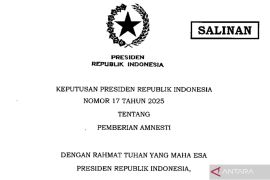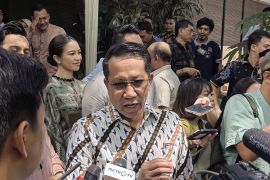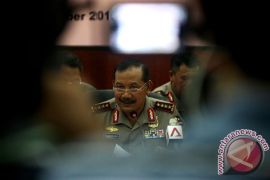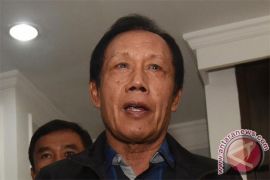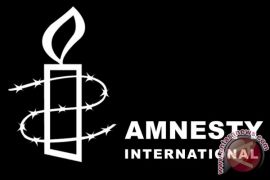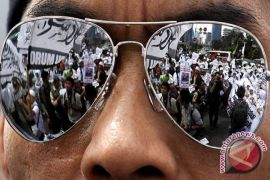The President believes that Pancasila, democracy, and human rights create a harmonious synergy, ensuring that the country remains on the right path toward a better and more inclusive future.
In Indonesia, Pancasila and democracy have long been essential elements of national life and have been fought for relentlessly by all segments of society.
However, the human rights aspect is often overlooked or neglected—especially for individuals considered to have committed wrongdoings and deemed unworthy of reintegration into society.
In reality, human rights are fundamental rights inherent to every person as a human being, regardless of nationality, ethnicity, religion, or any other status. These basic rights aim to guarantee dignity, freedom, and justice for all—including prisoners.
To uphold the human rights of prisoners, President Prabowo has proposed granting amnesty or clemency, guided by careful and selective principles.
The plan aims to provide criminal pardons to certain prisoners based on humanitarian and reconciliation considerations. It also seeks to address overcrowding in correctional facilities.
Additionally, the President's amnesty plan aims to reduce the criminalization of drug users for personal use.
Granting amnesty will bring joy to many prisoners' families by allowing them to reunite with their loved ones and offering opportunities for social reintegration—a return to society and normal life.
Initially, before verification and assessment, amnesty was planned for 44,495 prisoners. However, following verification, the number was reduced to 19,337 eligible recipients.
Among these, approximately 700 are drug offenders who passed verification and meet the "drug user" criteria outlined in Supreme Court (MA) Circular Letter No. 4 of 2010.
Nonetheless, the total number of prisoners eligible for amnesty may still change, as the Ministry of Immigration and Corrections continues its verification process.
Related news: 700 drug convicts eligible for amnesty: Minister Agtas
Recipients of amnesty
Since the policy prioritizes human rights, the President will remain selective in granting amnesty, establishing several eligibility categories.
Four categories of prisoners will be eligible for amnesty: drug users; violators of the Electronic Information and Transactions Law (ITE), such as those involved in insulting the president, head of state, or government; prisoners involved in sedition without weapons; and prisoners with special needs.
The special needs category includes individuals requiring palliative care, those with mental disorders, prisoners over 70 years of age, and persons with disabilities.
Amnesty for drug users is considered crucial to address Indonesia’s long-standing issue of prison overcrowding.
As of April 2024, Indonesia's prisons and detention centers held approximately 271,385 prisoners and detainees—far exceeding their intended capacity of 140,424 across 532 facilities. This represents an overcapacity rate of 93.26 percent.
Notably, around 53 percent of inmates—approximately 135,823 individuals—are drug-related offenders.
Related news: Budget efficiency is beneficial to prisoners' amnesty grants: Minister
Besides addressing overcrowding, amnesties could positively impact state budgets, given the high operational costs of correctional facilities.
Beyond relieving overcrowding, the amnesty program could also ease the state budget. The government allocates about Rp2 trillion (approximately US$122.8 million) annually for prisoner meals, a figure expected to rise with inflation and an increasing inmate population.
Under the new Criminal Code (KUHP), effective January 2, 2026, the government will emphasize restorative justice, including rehabilitative approaches for drug users—aligning with the principles behind the proposed amnesty.
ITE Law violations, especially those involving expressions against the Head of State, intersect with issues of freedom of expression. The President is considering granting amnesty in such cases, with sentences potentially replaced by community service—such as working in agriculture to support the national food self-sufficiency program or joining reserve component training.
To prevent exploitation and protect human rights, the Institute for Criminal Justice Reform (ICJR) reminds the government that community service must include fair compensation for participants.
Additionally, the government is encouraged to provide decent job opportunities for amnesty recipients, promote non-custodial alternatives, like vocational training, and prioritize their reintegration into society.
For sedition without weapons, amnesty will be focused on minor cases in Papua, as part of broader reconciliation efforts with the Papuan community. This approach reflects humanitarian values and seeks to promote social stability in the region.
Meanwhile, humanitarian based-amnesty is also planned for prisoners with special needs. For those with mental disorders or disabilities, it is preferable to transfer them to mental health facilities or hospitals instead of keeping them in prisons.
Related news: Government currently finalizing amnesty grant process: Minister
Related news: Amnesty to be granted to inmates passing criteria: RI Govt
Related news: No amnesty for armed insurgents for now: minister
Translator: Agatha, Kenzu
Editor: M Razi Rahman
Copyright © ANTARA 2025

